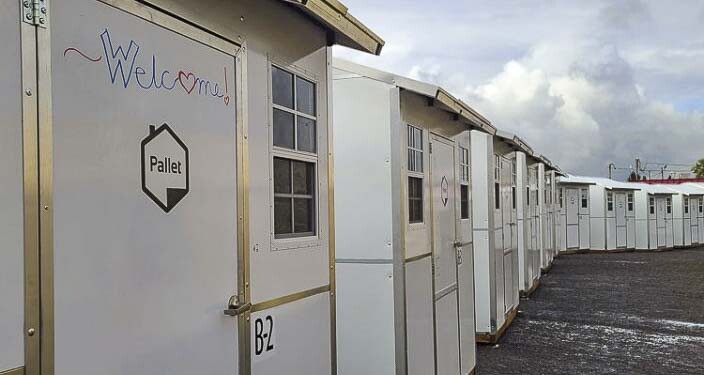
The city laid out its plans for the five Safe Stay modular shelters housing up to 40 people at its Sept. 18 City Council meeting
Shirleen Guerra
The Center Square Washington
The city of Vancouver is planning to open five “Safe Stay” shelters for homeless people, with each site providing up to 40 homeless people with their own private units that offer community spaces, restroom and sanitation units, storage facilities and garbage services.
The city laid out its plans for the five Safe Stay modular shelters housing up to 40 people at its Sept. 18 City Council meeting. The modular shelters are fenced and staffed 24 hours a day, seven days a week by the onsite nonprofit operator, Outsiders Inn.
The city opened its first Safe Stay site in Dec. 2023. Currently, there are two Safe Stay sites, and a third was approved for construction in August. The fourth site is in the final stages of planning, and the fifth site, included in the budget, has no location determined.
City Electric Co. bid the lowest at $708,307.68 for construction cost on the third site last month. The city stated it is spending an additional $225,000 on improvements for the existing Safe Stay sites.
Safe Stay is a program that helps homeless individuals with temporary housing while waiting for more permanent housing while trying to reduce the negative impacts of unsheltered homelessness.
According to documents, there are an estimated 500 to 600 homeless persons in tents or vehicles in Vancouver, posing a significantly large health and safety risk for those experiencing homelessness. The risk of physical danger also impacts single women and families with children.
As previously reported by The Center Square, in states like Colorado, Arizona, California, and Washington, cities are spending millions buying hotels to shelter people experiencing homelessness.
The contract with the Outsiders Inn will last from October 2023 to September 2024.
According to documents, since the beginning of the program for Safe Stay, 41% of those served have moved into permanent housing.
This report was first published by The Center Square Washington.
Also read:
- Opinion: In-n-Out Burger is so much more than fast food for so many of usPaul Valencia shares why In-n-Out Burger means more than just fast food for countless fans as Ridgefield nears its grand opening and Vancouver’s location begins construction.
- Obituary: Stephen Lloyd Randol, 1945-2025Stephen Randol, a Clark County resident for over 80 years, passed away on June 15. A celebration of life is scheduled for July 26 at Northcrest Community Church in Vancouver.
- Opinion: Washington’s June 2025 budget revisions – revenue up spending up moreMark Harmsworth of the Washington Policy Center critiques the state’s latest budget revisions, warning that new taxes—not organic growth—are driving revenue. He calls for fiscal restraint and long-term reform.
- Washougal fourth graders take flight with hands-on birdhouse projectFourth-grade students in Washougal connected science, math, and hands-on skills through a district-wide birdhouse building project supported by high school mentors and community volunteers.
- Opinion: Pedestrian control signalsDoug Dahl explains Washington state law regarding crosswalks and pedestrian signals, offering safety insights and common misunderstandings about traffic control at intersection
- Letter: ‘How can five part-time legislators without research support or reliable access to information serve as an effective check on six full-time elected executives’Bob Zak expresses agreement with recent opinions on the Clark County Charter’s imbalance and endorses John Ley’s transit preference while questioning light rail costs and Council effectiveness.
- Cowlitz Indian Tribe and Columbia River Mental Health Services announce Letter of Intent to protect behavioral health servicesThe Cowlitz Indian Tribe and Columbia River Mental Health Services signed a letter of intent to transition behavioral health services under the Tribe’s care, ensuring service continuity across Southwest Washington.












A money pit !!! Take the total operating costs, divide it by the number of residents served, and see what the cost-per-head comes out to. Of all the money spent, just how many have transitioned off the street and into permanent housing? Betcha the cost of those few success stories is astronomical !!!
“If you build it, they will come”… Vancouver City hasn’t yet learned that you cannot spend your way out of homelessness. The more money and services provided, the more homeless there will be to absorb those monies and services.
In years past, what served as the impetus for not living on the street? Fear of being hungry and cold come quickly to mind. Now, without having to worry about being hungry or cold, there is no reason to be responsible and get a job and be a contributing member of society. It is far too easy to simply be a leech.
Instead of making it easier, Vancouver should be making it harder to participate in these high-cost programs. Start by drug-testing every applicant; if you’re dirty then you get no assistance. When the druggies get cold enough and hungry enough, then they will either 1) figure it out and get clean, 2) get the snot beat out of them (or killed) in the commission of a crime, or 3) they will move on to someplace else where drug addicts are treated with open arms and with boat-loads of money… you know, like Vancouver is doing now. Either way, it’s a win for the honest tax-paying members of our community who have self-respect and a sense of responsibility.
I’m sick and tired of my tax money going to support drug addicts and the mentally ill via local, grass-root level programs in which the cost-per-head and cost-per-successful-story is simply unsustainable. In the meantime, emergency services and road-maintenance crews and my local school all have to figure out a way to raise money because, they say, needed tax dollars are just not there.
You are a gross, filthy human..